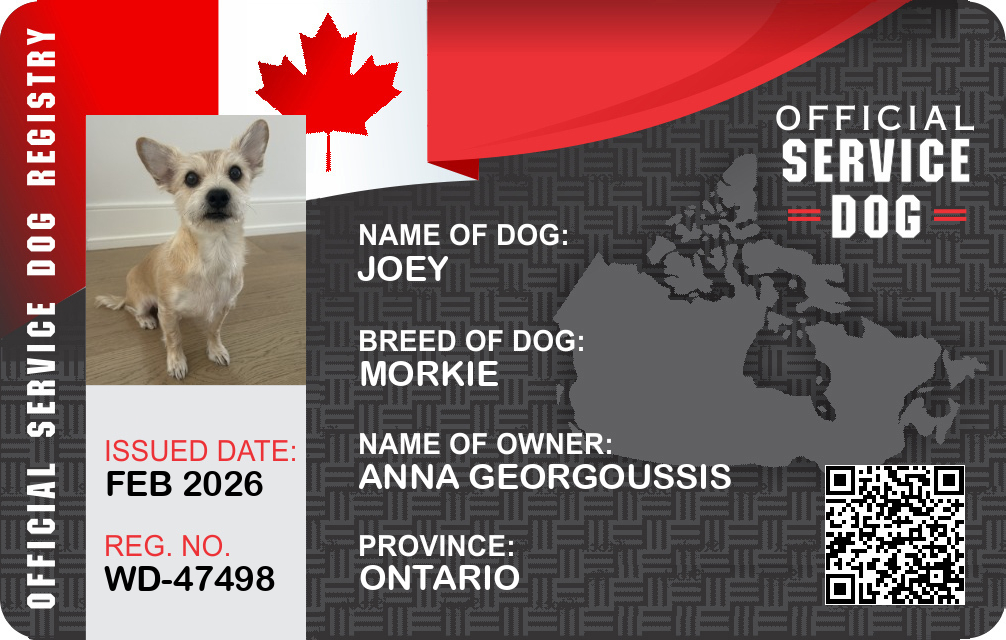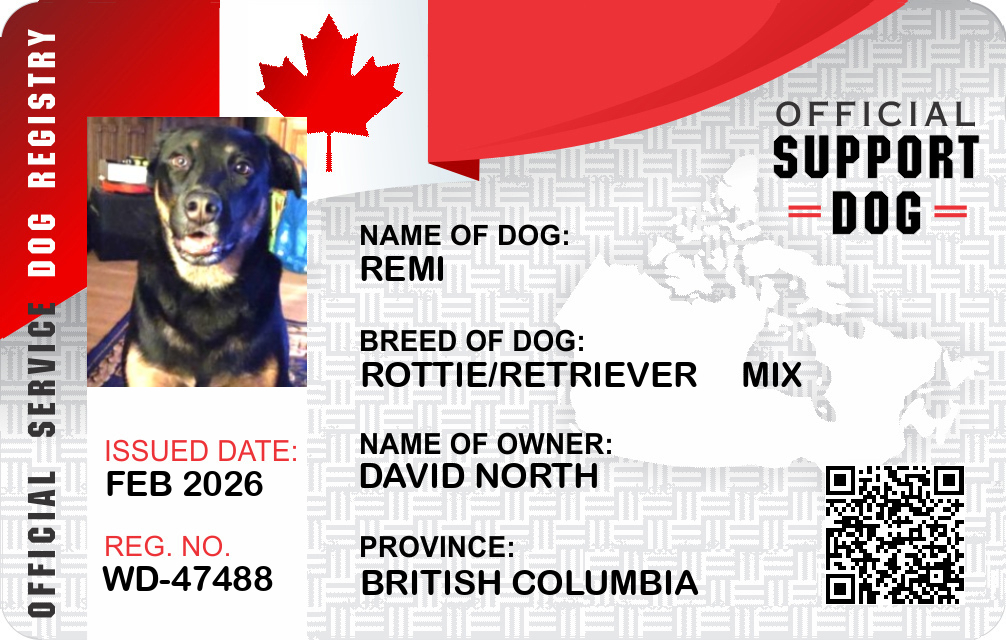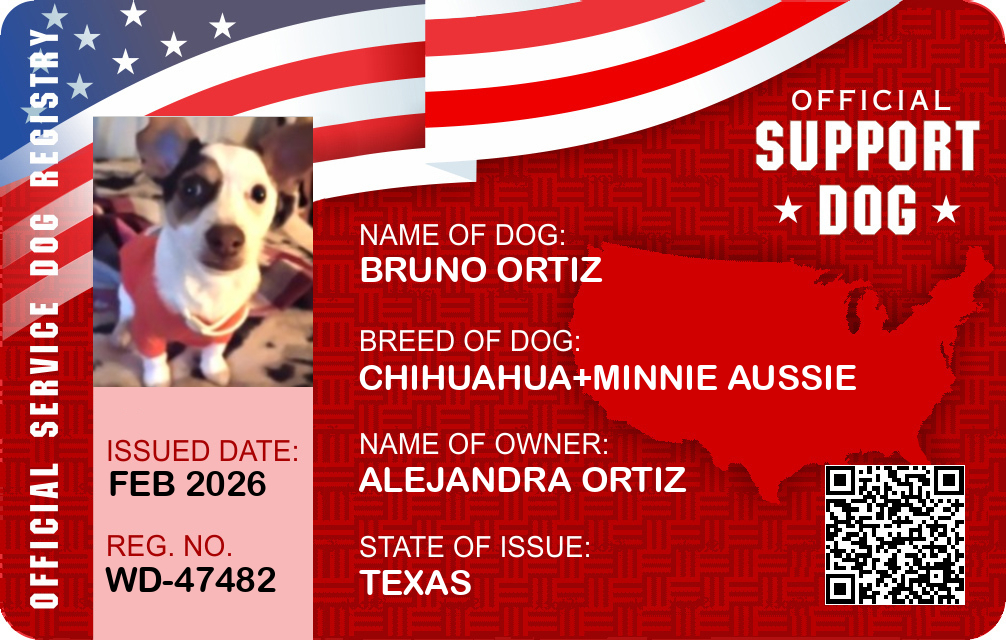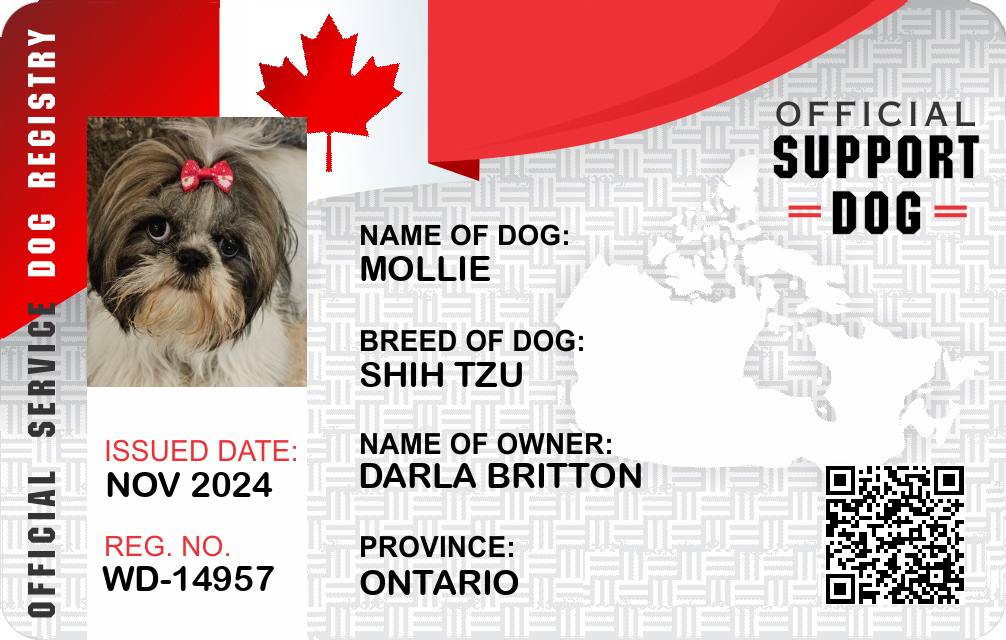Oregon Service Dog Laws
Get Your Documents
Example State Cards

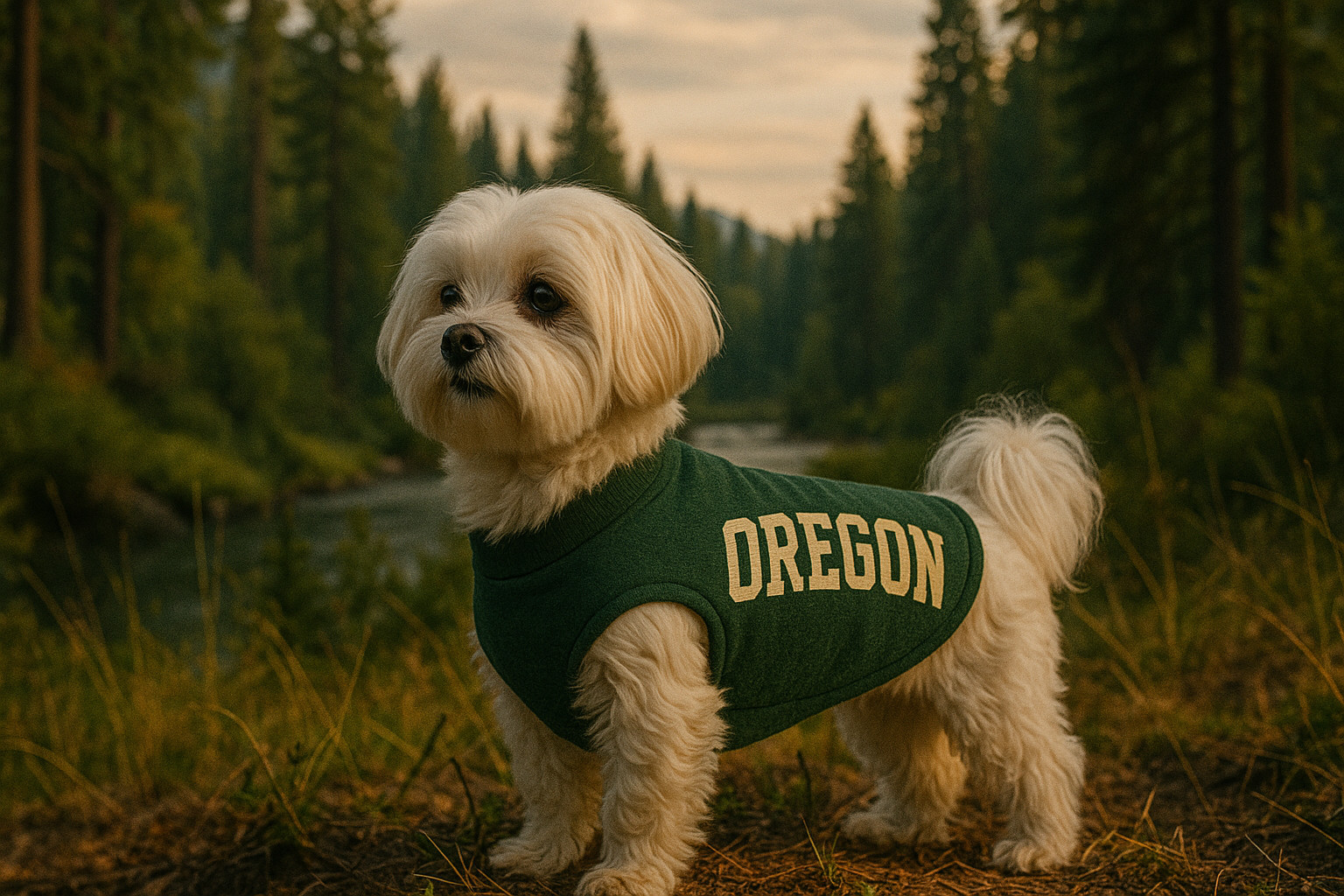
Overview of Service Dog and Legal Definitions in Oregon
What is a Service Dog?
A service dog is defined under both federal and Oregon state laws as a dog that is individually trained to perform tasks or do work for a person with a disability. These tasks must directly relate to the handler’s disability, enabling them to perform tasks they would otherwise find difficult due to their condition. Disabilities can range widely, from physical impairments to psychological or neurological conditions. Importantly, only dogs are recognized as service animals under these laws, and their primary role is to perform specific functions that aid their handlers.
How Service Dogs Differ from Other Types of Assistance Animals
Service dogs are distinct from emotional support animals (ESA) and therapy animals, which are not viewed as service animals under Oregon law or the federal Americans with Disabilities Act (ADA). While ESA provide comfort through their presence and may be prescribed by a mental health professional, they do not perform specific tasks to mitigate a disability. Therapy animals, on the other hand, are often used in clinical settings to provide therapeutic emotional benefits but are not afforded the same legal status as service dogs.
Key Federal Laws Affecting Service Dogs (e.g., ADA, FHA, ACAA)
The ADA is pivotal in ensuring access rights to people with service dogs by mandating that businesses and public entities allow these dogs to accompany their handlers. It requires that service dogs have access to places where the public is allowed. The Fair Housing Act (FHA) protects against discrimination in housing situations, giving individuals with service dogs the right to live where they choose, regardless of pet policies. The Air Carrier Access Act (ACAA) allows for service dogs to accompany their handlers on flights, though airlines have specific rules about documentation and behavior.
State-Specific Service Dog Laws in Oregon
Oregon aligns closely with federal standards but provides its own legal stipulations concerning service dogs. The state’s statutes reinforce the definition provided by the ADA and clarify access rights across public entities. Oregon laws emphasize the requirement for dogs to be under control and outline penalties for misrepresentation more explicitly than federal law, underscoring the serious nature of service dog fraud within the state.
Housing Rights and Responsibilities
Under both federal and Oregon law, individuals with service dogs have a right to reasonable accommodation. This includes exceptions to “no pets” policies in rental agreements. Landlords in Oregon cannot charge pet fees for service dogs, nor can they refuse housing due to an individual’s reliance on a service dog. However, a landlord may request documentation to confirm the service dog’s status, such as a disabled individual’s need for task performance related to the disability.
Public Access and Accommodation
Service dogs must be allowed in all public areas where their handler is permitted except in situations where the dog’s presence would compromise safety or fundamentally alter the nature of a program. Businesses can ask if the dog is needed due to a disability and inquire about the tasks it performs but cannot ask for documentation or demand an explanation of the handler’s disability. Oregon law is clear that any discrimination against handlers of service dogs in public is unlawful.
Transportation and Travel Rules
The ACAA governs travel on airplanes, and airlines operating in Oregon must adhere to these rules. Service dogs are allowed to fly with their handlers, typically at no additional charge, though some airlines may request notification and specific documentation beforehand. Oregon’s public transportation systems, similarly, must accommodate service dogs in all areas used by passengers. The dogs must be well-behaved and under control at all times.
Employment and Workplace Considerations
In the realm of employment, the ADA protects individuals who require a service dog to perform their job. Employers in Oregon must make reasonable accommodations for employees with service dogs unless doing so causes undue hardship. This could include allowing the service dog in all necessary areas of the workplace. Employers can request documentation or verification similarly to housing but cannot make broad inferences about the employee’s disability.
Documentation, Requirements, and Processes in Oregon
Service Dog Documentation and Who Can Issue It
In Oregon, no official certification authority exists for service dogs. This aligns with ADA standards, which do not require certification as a condition for access rights. Instead, handlers typically need documentation from a medical professional stating the necessity of the service dog for a disability, primarily used in housing and employment contexts. Veterinary records showing up-to-date vaccinations and health clearances are also crucial.
Landlord, Business, and Provider Verification Rules
Landlords, business operators, and service providers can request documentation indicating the need for a service dog; however, they must avoid demanding identification cards or the dog’s training documentation as proof. Potential verification typically involves a healthcare provider’s note explaining the necessity of a service animal to perform specific tasks that aid the handler’s disability.
Rights, Limitations, and Legal Risks
Rights Service Dog Handlers Have in Oregon
Service dog handlers have comprehensive rights to access public places, housing, and employment similar to any individual without a service animal. They cannot be harassed, isolated, or charged extra for the presence of a service dog. Public and private entities must provide the same level of service to individuals with and without service dogs.
Limits on Service Dog Protections and Common Restrictions
There are exceptions where service dogs might be asked to leave a premise, including scenarios where they are out of control, not house trained, or threaten health and safety. Areas such as sensitive hospital units and certain sterile environments may restrict service dogs if there is a legitimate health concern.
Penalties for Fraud or Misrepresentation
Misrepresenting a pet as a service dog is a serious offense in Oregon with potential legal consequences. Fines can be imposed on individuals who falsely claim their pet is a service dog. These legal measures are in place to protect individuals with disabilities who genuinely rely on service dogs for daily function.
Practical Guidance for Service Dog Handlers in Oregon
How to Qualify for a Service Dog Legitimately
Qualification involves having a verifiable disability and a need for a service dog to perform specific tasks related to the disability. Obtaining a service dog from a legitimate training program or organization ensures that the dog is adequately trained to meet legal standards.
How to Talk to Landlords, Airlines, and Employers
When discussing service dogs with landlords, airlines, or employers, be prepared to present basic documentation, explain the dog’s task without disclosing personal medical information, and reassure them of the dog’s behavior and health. Providing clear, concise communication can foster better understanding and compliance.
Summary of Service Dog Laws in Oregon
- Service dog defined as individually trained to perform tasks for a disability
- Service dogs differ from ESA; only service dogs have full access rights
- ADA, FHA, and ACAA provide overarching legal protections
- Oregon law reinforces federal rights, requiring compliance in housing and public accommodations
- No certification needed, but documentation from medical professionals may be requested
- Penalties in Oregon for service dog misrepresentation to protect legitimate users
- Handlers should familiarize themselves with rights, prepare necessary documentation, and communicate effectively with entities
This guide highlights the important aspects of service dog laws in Oregon, ensuring handlers understand their rights and obligations, thereby enhancing harmonious coexistence between service dog handlers and the wider community.
Get Your Documents
Example State Cards





